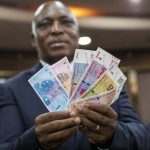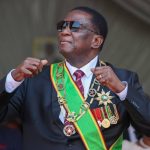HON. MUSHORIWA: Thank you Mr. Speaker Sir. My supplementary question to the Hon. Minister; he said in his response that the Government had to make a decision of whether to devalue the dollar like the RBZ then did or sell the gold that we have in stock. Has it now become then for the policy of the Government that it will pursue the so called speculators in respect to the rate and that we are abandoning our initial stance that we have got a structured currency, which is backed by gold whose price on the international market is actually going up. So, could the Hon. Minister help us to understand in which direction are we going as a country?
HON. D. K. MNANGAGWA: Thank you Mr. Speaker Sir. Government policy on monetary issues will be guided by the monetary policy. As it stands, the monetary policy, as annunciated by the Governor, is still Government policy. When there is a change, there will be a new monetary policy statement that comes if there is a change. I would not be able to pronounce any policy that is contrary to the monetary policy that already exists. I would think that the Hon. Member is fully alive to the monetary policy and I am not sure which other policy he refers to as new Government policy. The policy exists, it is written and it is there.
HON. MADZIVANYIKA: I thank the Minister for the response and my supplementary question comes as a follow up to the response by the Minister to the effect that it appears there is a social contract between business and Government. My supplementary question is on the 5th April, 2024 when the monetary policy was introduced, there was a mention that the local currency is going to be allowed to be floating freely. However, Government, on the 27th September, made a decision through the Monetary Policy Committee to the fact that we are now devaluing our currency. Does that not sound inconsistent with the Monetary Policy pronouncement of the 5th of April in the first place to the fact that our foreign currency to the exchange rate will be determined by the market force or demand and supply? Is the flawed social contract not caused by Government’s inconsistency to its policy pronouncements?
HON. D. K. MNANGAGWA: I am not sure where the inconsistency is. Prior to the 27th September, Government or the monetary authorities had a rate at which they were intervening on the interbank exchange rate at a value that they believed to be what is prevailing and that is the rate that businesses, industries and I would say, some dishonest players as well, were getting foreign currency.
By the 27th September, new realities were obtaining and the market was signalling a different rate. The Governor came in and intervened at what he believed to be the market rate at the time which was at ZiG25. On a willing buyer willing seller, the willing seller puts his foreign currency at the rate he believes his foreign currency to be worth. The willing buyer will also put an offer. When the RBZ comes in and makes an offer or puts in foreign currency, they are doing it as a willing seller. This is where the flawed social contract is.
You have a multitude of willing buyers, not too many willing sellers to be able to determine what that market rate is. We cannot determine a national official rate by what is obtaining in the streets. It will be counter to functional economy. So, the moment we have a willing buyer willing seller, that is functional, which are the few areas that are being worked on right now, we will have a market rate that is truly non-speculative and can be used by industry, government and people in general. Thank you.
(301 VIEWS)


